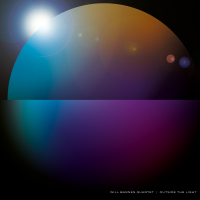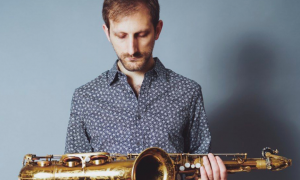Home » Jazz Articles » Interview » Lorraine Feather: The Girl With the Lazy Eye
Lorraine Feather: The Girl With the Lazy Eye
New York City Drag elicited rave reviews. Zan Stewart of Down Beat wrote: "Employing Fats Waller's attractive and still meaningful '30s music, the gleaming-voiced, fluid and articulate Feather concocts a variety of mostly contemporary scenarios—many humorous, some disquieting...emotive whammy...glowingly tributes Waller and his ilk;" while Charles Champlin of the Los Angeles Times wrote: "Her new twinning of words and music based on chop-busting, improvised choruses do not simply recall previously heard melodies and riffs; the words, in Lorraine's supple and engaging voice, bring a new luster and excitement."
Of Such Sweet Thunder, Nat Hentoff, the esteemed old professor of jazz himself, wrote: "At this point I have to say, and I never had the temerity to say this to Duke, that in a number of others' attempts to put lyrics to Duke's music, they missed his swift and amused sense, for example, of the unintended consequences of desire. Lorraine has that perception in the stories that are her lyrics. I wish she had been around as a lyricist when Duke was. I think they could have collaborated."
Because as much as Lorraine Feather and her lineage could be loftily viewed as the embodiment of the Jazz Age, she is far more than a time-traveler or historical reference point. All good writers live in their constructed worlds long enough to write about them. Like a successful student in the Flemish School of painters during the European renaissance, she had studied the masters to the point where her own mastery was becoming an extension of theirs—but the more she was drawn to working with them, the greater the urge became to collaborate with the talented contemporary composers she had come to know, and do entirely original work.
"On Dooji Wooji (Sanctuary, 2005) I discovered that I was suddenly allowed to use the three other Ellington pieces I had worked on. I'd become smitten with the 'small big band' sound he popularized in the early 30s and much of the album goes for that vibe. That CD included Eddie's and my song 'I Know the Way to Brooklyn,'which Janis Siegel sings on the road... in fact we sang it together at Jazz Alley in Seattle when the Transfer were there—also 'Remembering to Breathe,' a song I wrote with Bill Elliott right before he moved east to teach at Berklee. As with 'The Girl with the Lazy Eye,' the music was written to my lyrics before the get-together, and when I heard him play it I teared up. I think Bill was a little taken aback, but it really touched me. I had started to work with Shelly Berg on the previous album and he wrote two tunes with Eddie and me on this one, 'Once Bitten' and 'Cicada Time,' the latter in honor of the mysterious insect's reappearance that year after 17 years underground.
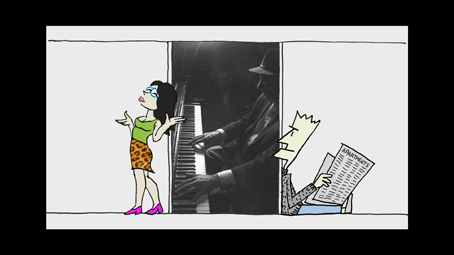
Production cel from 2009 short film, You're Outa Here" produced by Feather, in collaboration with animator George Griffin That's pianist Dick Hyman stylin' on the ivories
"With Language I went with all-original songs, music by my living collaborators. I was able to have three kick-ass vocalists guest: Tierney Sutton, Janis Siegel, Cheryl Bentyne. I had sung with Janis and Cheryl before on the Dick Tracy soundtrack, but never with Tierney, and they were all a delight to work with. I'd heard the Hornheads track 'Can't Quite Put My Finger On It' driving to a sound check in Plano, TX and looked up Michael B. Nelson to ask if I could adapt it. Gary Grant put together one of his killer horn sections for that song, 'Waiting Tables.' I wanted to do acoustic versions of 'Very Unbecoming' and 'Where Are My Keys?' and Shelly arranged them. For some reason I thought the talking sections might put people off, I guess because you don't hear a lot of that on jazz recordings, but no one ever mentioned it. Eddie's and my 'Making It Up as We Go Along' was supposed to be on Café Society, but that was when I thought that album would be all ballads. . . the concept turned out to be too lugubrious and I replaced several ballads with up tunes, but I always wanted to have that song on a CD. Mike Lang plays so beautifully on the track. Shelly and I wrote 'Traffic and Weather' and 'We Appreciate Your Patience' in record time, at this house in LA. And Russ and I did the song that made me laugh the most when we were working on it, 'Hit the Ground Runnin.'"
Making herself and other people laugh, as it turns out, is something Feather does too easily. No songwriter wants to be known for writing humorous tunes any more than an actor wants to be remembered as a comedian. Who wants to be remembered as a novelty act, the Spike Jones of the new millennium, or a cult favorite in France who never wins the big awards?
But one of the aspects of finding one's own artistic voice is discovering talents or predilections one has not suspected. Almost effortlessly, it would seem, Feather's lyrics can produce everything from ironic smiles, embarrassed chortles or little snickers all the way up to loud, satisfying, gasping-for-air guffaws.
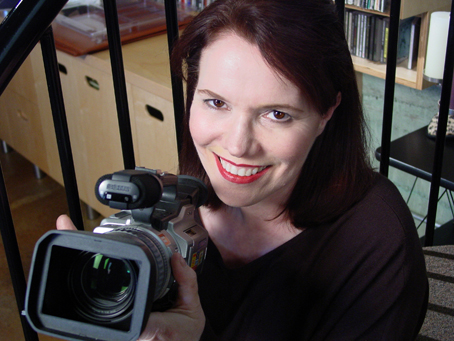
Nowhere is this more in evidence than in the videos she has produced, mostly with her own camerawork and editing, sometimes in collaboration with her husband Tony. With the exception of the video she did to accompany her heart-rending "Remembering to Breathe," the song whose lyrics she wrote as advice to a fictional, aspiring young ballet dancer, her videos produce such mirth that they can be revisted as often as one needs to laugh. While last year's hilarious award-winning short film You're Outa Here will not be available until animator George Griffin has completed work on compiling a DVD of his work, "The Making of New York City Drag," "Rockin' in Rhythm," and "The 101" are available on her website.
Ages
 Lorraine Feather got a bit of a late start answering her true calling. Not that she hadn't worked hard at it, but like many creative people, she was a proverbial jack-of-all-trades who discovered as she went along that she could work competently in a number of artistic fields, and have fun trying them all. By the time she realized what her mad passion was, her raison d'être, she had already had a career as a dancer and singer, though not on the level she would have wanted. In her new tune "Two Desperate Women in Their Late 30's," she describes in some autobiographical detail what she and her fellow singer, Linda Lawley, were both experiencing.
Lorraine Feather got a bit of a late start answering her true calling. Not that she hadn't worked hard at it, but like many creative people, she was a proverbial jack-of-all-trades who discovered as she went along that she could work competently in a number of artistic fields, and have fun trying them all. By the time she realized what her mad passion was, her raison d'être, she had already had a career as a dancer and singer, though not on the level she would have wanted. In her new tune "Two Desperate Women in Their Late 30's," she describes in some autobiographical detail what she and her fellow singer, Linda Lawley, were both experiencing.
One day we would again have it made,
Sip fine wine on the mountain,
Tally up our successes,
Dressed in hand-beaded dresses.
But for now we'd swill hard lemonade
By the fiberglass fountain,
Each ignoring the oncoming train
That was otherwise known
As Our Fortieth Birthdays,
To be desperately feared.
Ever closer it neared.
Told uniquely as a song sung about, or perhaps to her friend who has now passed, her typically ironic brand of self-aware, self-deprecating humor allows her to recount the bittersweet story of all the painful pitfalls in their ambitious scrambling in the music world, battling failures real and imagined, bucking up against cultural and professional ageism all the way.
Maybe in some corner of her mind she had known that her rose could well bloom late, but it would indeed bloom, as indicated in the lyrics of an early effort like "Cézanne" on 2001's New York City Drag:
The mountain,
A thousand tries and countin.'
You drew and you drew—
It always eluded you
(Now and then you would paint your wife).
You had no betters,
And in your letters,
Wrote you finally had sight of
The light of your promised land,
On the other side of sixty.
The lyrics she wrote for "Cézanne," like many of the songs she has written throughout her career, address the hard issues that an artist faces in being an artist: artistic drive, which is never easy to describe in everyday terms; personal esteem, the kind one accords to oneself; the ability to believe in one's own vision; and the courage to keep on living and aging in a world obsessed with youth. Like a few other songs she had written, she might well have included it on Ages.
But Ages is a complete, self-contained work. In many ways it is a culmination of Feather's broodings and earlier studies, a direct confrontation of what is likely the most frightening aspect of being human. That someday one will not be here again in this life is the most chilling thing of all. Feather does not spend undue time on Ages in the depths of the metaphysics of life and death, but she does indeed tackle it on her soaringly beautiful "Perugia," a song she wrote for her father Leonard. The man who had looked up at his daughter Lorraine as he lay dying was known to jazz readers and historians as the chronicler of the Jazz Age, but he was simply her loving father, the man who had held her in his arms in her infancy. There is nothing complicated about the emotions of the piece, with lyrics written for Russell Ferrante's haunting interpretation of Felix Mendelssohn's "Venetianisches Gondellied."
I told you what was fading fast,
Was not, and had never been, you.
You met my gaze, and smiled at last,
Because you adored me,
Because you believed it was true.
Perhaps even more than one's own death, the idea that one might never again see a loved one is the most excruciating pain of all. Feather's emotional bravery in writing and performing this intensely personal song, accompanied by Ferrante's sensitive playing, can be a breathtaking catharsis for anyone who has ever lost a parent.
 "This album has the most ballads of any I've done. Radio tends to play the more jokey tunes, which I understand because most of the femme jazz singers do not do that and it mixes things up programming-wise.
"This album has the most ballads of any I've done. Radio tends to play the more jokey tunes, which I understand because most of the femme jazz singers do not do that and it mixes things up programming-wise. "People often assume that every lyric is autobiographical. Almost all of my songs are a mixture of things that happened to me, things that happened to friends of mine, stories I've heard or read, and simple flights of fancy or gross exaggeration. It does please me when someone gets what I was going for in a song, especially when it's not spelled out. I've written some sarcastic lyrics over the years, a couple that never saw the light of day and rightly so. I don't mind being bitchy now and then but there's too much seething hostility in the world."
And the multilayered aspects of the lyrics which sometimes reverberate and resonate like lines from Emily Dickinson?
"I don't set out to accomplish it, but discover things as I go along. I came across Bela Fleck's 'Circus of Regrets' and fell in love with it. In the case of that song, I found a title I liked ['Peculiar Universe'], that felt right with the first line, and it seemed to unwind from there.
"I wrote two verses of lyrics, recorded over the original in Tony's and my little home studio, and sent it to Béla and he approved. When I asked Russ to arrange it he told me he had to stop the recording a few times to determine what time signature it was in—I see three of them on his chart—as I sang along I had no idea and still can't tell. He also asked me what on earth possessed me to think of putting words to such a piece! He liked the concept though. I asked if he would write some kind of intro. With a great musician/arranger you can make a request that vague and then when you get to the session it's a swell surprise. I thought what he did with Warren Luening's trumpet was so evocative.
"I saw a kind of montage when I was writing the words, beginning in a surreal version of New York and ending in a suburban backyard. The song is about losing love, and it could be about being left by someone generally, but the 'Phones ring, words fall, eyes fill' line is about the phone call telling you that someone has died. That's what I was thinking of anyway. I read a short story once that I was thinking about toward the end of the song. It was about somebody in a deep state of grief who suddenly, for no particular reason, feels released from it for a moment and has the sensation of swimming in space with the moon and stars. I don't know what the story was called and I may be remembering it wrong! Béla writes about space and planets a lot... 'Mars needs Women' [for example]... but 'Circus of Regrets' was dedicated to Bozo the Clown. I didn't know that till later, but it just goes to show you.
"Eddie Arkin and I have written together for over two decades and are very close friends, like, the kind of friend you would call if you were lost in a bad part of town, or if you were having a shop-gasmic experience at Costco. Aside from the depth of his musical knowledge, Eddie is the most flexible collaborator ever. If necessary he'll fully rewrite something three times and each version exceeds the last. Usually I bring lyrics to him and he sits and noodles at the piano or guitar and works through the song, but this last year we've done a lot by phone, meaning periodically we'll hang up and he'll send me an mp3. He gets very excited when he likes something and it's always a treat. Once when I was recording a song of Russell's and mine called 'On the Esplanade' and Eddie was in the control booth hearing the lyrics for the first time, he opened the door after a take and called in to me with wry delight, 'Inky sky! Barnacled pilings!' He's an excellent guitarist and wrote a well-known guitar book [Creative Chord Substitution for Jazz Guitar (Warner Bros. Publications)]. He and Grant [Geissman] used to be in a band together.
"I met Shelly [Berg] when I was looking for someone to play the stride music for the Fats album at a Catalina's gig. Stride is very hard to learn, and who the hell has the time? Somebody suggested Shelly, who was head of the jazz department at USC at the time, and he signed on. The gig was in two weeks, Don Heckman was reviewing for the LA Times, and Shelly nailed it. As a composer, he has a terrific knack for creating jazz tunes that are both interesting and catchy, and writes freakishly fast. It's harder to get together now because we moved as far apart as two people could and still be in the contiguous U.S. [Washington State and Florida], so we wrote the Ages songs whenever we performed on the road. He came up with the music for 'I Always Had a Thing for You' in a half hour at a sound check in Cleveland.
"My relationship with Russell [Ferrante] has progressed more slowly. He's away a lot with the Yellowjackets. We have never worked together live, but we struck up a writing collaboration during the Café Society album—he wrote the music for the title tune—and worked together closely on Language and Ages. He was a huge part of this album, both his extraordinary playing, the way he arranged 'Perugia' and 'Peculiar Universe,' and his composing of course. As I said on the song comments on my site, my favorite writing experience with Russ doing this last project was the way I gave him my concept for 'The Girl with the Lazy Eye' and he wrote something entirely different in the middle of the night before we were to get together, music that sounded a hundred years old. He's a beautiful soul as well as being ridiculously talented.
"One thing I love about all these guys I have a working chemistry with, is that they're so droll."
What about the individual musicians who perform on Ages?
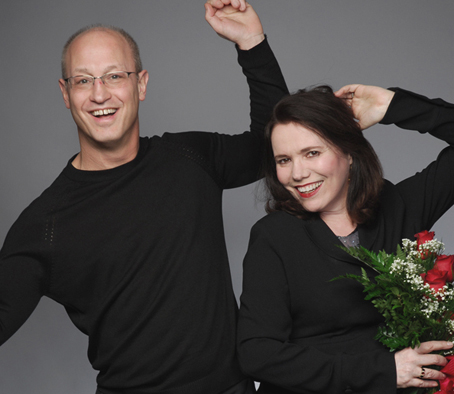
Shelly Berg and Lorraine Feather
"Michael Valerio is a treasure. I met him years ago when the late, dear and great Dave Carpenter was unavailable for a session. Mike contributed so many ideas during the Ages sessions. For example, he played a harmony on the opening figure of 'How Did We End Up Here?' that was not planned, and when the arrangement called for him to drop out at the end of 'Two Desperate Women' he started whacking the bass as another percussion part.
"I don't remember the first time I worked with Gregg Field but as with all the guys it kind of feels like forever. Gregg specializes in the ultra-tasty swing grooves. He's producer-ly at the session and really listens, and he's great at picking up on little nuances in the singer's phrasing. He's married to Monica Mancini and knows how to accompany a singer. He was with Frank Sinatra for some years. You can tell.
"Mike Shapiro, the other Ages drummer, is known for the Brazilian thing, works or has worked with Lani Hall and Herb Alpert, with Sergio [Mendez], Dori Caymmi. . . but he does a lot more than that. He also listens closely and is highly inventive. The entire ending of 'Old at 18/Dog Bowl' was left loose, and what they came up with on the first take was perfect. Mike is devoted to the music, cares a lot, and grooves like nobody's business.
"I've known Grant Geissman for a long, long, time, over a quarter-century. He's one of those people who keeps expanding as he gets older, as evidenced by his CD Cool Man Cool (Open All Nite/Futurism Records, 2009). He's done a lot of studio work but Grant is a serious jazz player, as all the world knows, and you can always depend on him to be right in the pocket, solo creatively, everything you could want from a guitarist.
"Warren Luening is what you might call an unsung hero on trumpet, but he is 'sung,' meaning a lot of people know how great he is. I had never met him before the date. Eddie recommended him and I was so glad he could do it. He seems to play so effortlessly but with such chops. Bob Leatherbarrow is somebody I've known for decades, he's terrific on both drums and vibes. He and my husband Tony played together with Peggy Lee.
"And as far as Tony goes, he helped a lot this time out on many of the tunes, either laying down a groove for songwriting purposes or actually playing—trash can and dog bowl! He plays these funky little patterns on various objects... when Sterling and Brava hear the dog bowl groove they know it's dinnertime."
The Lyricist's Craft
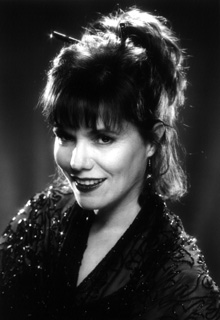 When Lorraine Feather has written lyrics for a Fats Waller or Duke Ellington tune, the musical foundation was there for her, a structure on which to build. But when she writes the lyrics first, then hands the piece over to a musical collaborator, the lyrics are the rhythmic foundation. Does she hear music when she writes the lyrics? Is there a metrical or harmonic structure that is a kind of rudimentary composition?
When Lorraine Feather has written lyrics for a Fats Waller or Duke Ellington tune, the musical foundation was there for her, a structure on which to build. But when she writes the lyrics first, then hands the piece over to a musical collaborator, the lyrics are the rhythmic foundation. Does she hear music when she writes the lyrics? Is there a metrical or harmonic structure that is a kind of rudimentary composition? "That's a good question. I don't remember having been asked it before, or quite that way. In the case of an up-tempo tune I usually have either a template, something I listen to or think of when writing the lyrics, or just a rhythm. With 'A Lot to Remember' it was Charlie Christian's 'Waiting for Benny,' but as Eddie and I worked through it, the character changed a lot from the vibe of the Christian tune. The talking thing at the beginning just came to me off the top of my head. With 'How Did We End Up Here?' it was a rumba groove my husband Tony recorded at home, but in the studio, it seemed to want to go a different way and that's part of the fun of making an album. Gregg Field once helped me out by recording a dozen grooves."
And when she first gives a set of lyrics to Russell Ferrante or Eddie Arkin or Shelly Berg, how would that conversation go? Each is already aware of her vocal range, what she is comfortable with and what she likes. How much "instruction" does she give them?
"We work through it in person for the most part. If something is going to an awkward place for me vocally I let them know and they finesse the melody one way or the other. It's pretty organic."
But her composer/collaborators must at some point move beyond parameters and just compose music. On of the most memorable melodies on Ages was written in the middle of the night, with no input at all from Feather, by a jet-lagged Russell Ferrante. The composition, which is reminiscent of Scott Joplin or James P. Johnson, took Feather by surprise. What does she tell a collaborator in advance, and what doesn't she tell him?
"I might tell them how I envision the track starting or ask what they think of such-and-such idea or mood. If a verse seems too long or short or a line does, I adapt. A song takes on a life of its own. That experience with Russ was kind of an eye-opener. It made me realize that sometimes I should just shut up."
Who are some of the lyricists who have inspired her along the way?
"Stephen Sondheim is literally without peer and always inspiring. Johnny Mercer, of course. There are certain songs by certain writers that I think of all the time, particular lines in them especially. Joni Mitchell in 'Down to You': 'Old friends seem indifferent/You must have brought that on'; Suzanne Vega's 'Ironbound/Fancy Poultry': 'Backs are cheap and wings are nearly free.' Prince has written some killer lines that I thought were so funny in a camp way."
What about Feather's own lyrics? She is quite candid about her opinions of her music, and freely critiques it for anyone who can take it. What does she truly like of her own work?
" 'Antarctica' from Such Sweet Thunder. I really was pleased with [the line] 'I cried all night/That's half a year.' 'We Appreciate Your Patience,' which I wrote with Shelly Berg, for Language; 'How Did We End Up Here?' and 'The Girl with the Lazy Eye' from Ages, with Eddie Arkin and Russell Ferrante, respectively.
"I can't divorce the lyrics from the music, and there are some songs that I feel are most wedded to the music my co-writers created. Or there might be some odd line or phrase that was fun to sing and took more practice than usual, like 'Connecticut prep school' [from the song, 'Scrabble']."
'I Always Had a Thing for You' is a simple tune that is a paean to emotional honesty. What about the emotional release a writer feels from successful lyrical expression?
"It's very satisfying, sometimes upsetting along the way of course. There are some songs I couldn't sing through without crying the first dozen or so times, or I'd have to dig my fingernails into my hand in the studio. I also enjoy cracking myself up, or my co-writers.
"I definitely feel most balanced when I've been writing, whether the song is about me strictly speaking, or not."
How Did We End Up Here?
A few years ago Lorraine Feather, her husband Tony and their dogs Sterling and Brava moved from the San Francisco Bay area to the San Juan Islands, there to float in the idyllic Strait of Juan de Fuca between Washington State's Olympic Peninsula and Vancouver Island. The answer to the question she poses in her tune "How Did We End Up Here?" sounds rhetorical if the best you've ever seen is Martha's Vineyard or Long Island, but when you've seen these islands, the answer is easy: "How Could You Live Anywhere Else?" It is one of the most beautiful places in North America.Don't tell anybody.
True, there are no Jewish delicatessens, no nightclubs, not even cab service. Having no garbage disposal or trash pickup is a bitch ("We go to the Solid Waste Disposal place twice a month to throw our trash bags into the communal reeking pile," she says). On the other hand, there's the panoramic view of the Pacific Ocean and the deer who show up for a breakfast graze on your lawn in the mornings.
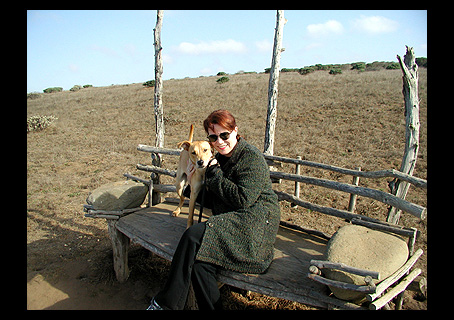
Lorraine Feather and Sterling
To make a record date in L.A., you have to be willing to endure a full day of traveling, including a slow ferry ride or lurching flight on a puddle-jumper to SEA/TAC. And once in the Big Orange, you have to listen tolerantly to the incredulous taunts of people who can't believe you don't even have pizza delivery.
But life is sometimes better seen from an acute angle.
Are Feather's intellectual approach and precision of language a barrier to her as a recording artist? Is the problem that there is a small audience, or is it, as with much of jazz, just a matter of getting record companies to give it enough exposure through aggressive marketing?
"There is a small audience all right. It's difficult for a singer-songwriter in jazz, too, unless you have that aggressive marketing behind you, but I love doing it and I don't care. In my case, my albums have also been a calling card for me as a writer and led to my being hired as a lyricist on different occasions. And hey, you never know when a song will be licensed for something. Hmm, I wonder if a studio ever made that movie of the book Word Freak (Heartbreak, Triumph, Genius, and Obsession in the World of Competitive Scrabble Players)...?"
Selected Discography
Lorraine Feather, Attachments (Jazzed Media, 2013)Lorraine Feather, Fourteen (Relarion, 2013)
Lorraine Feather, Tales of the Unusual (Jazzed Media, 2012)
Lorraine Feather, Ages (Jazzed Media, 2010)
Real Divas, Café Society (Factor, 2010)
Lorraine Feather, Language (Jazzed Media, 2008)
Lorraine Feather, Dooji Wooji (Sanctuary, 2005)
Ernie Watts, Spirit Song (Flying Dolphin, 2005)
Lorraine Feather, Such Sweet Thunder, (Sanctuary, 2004)
Original Soundtrack, The Princess Dairies 2: Royal Engagement (Walt Disney, 2004)
Carmen Bradford, Home with You (Azica, 2004)
Lorraine Feather, Café Society (Sanctuary, 2003)
Lorraine Feather, Original Soundtrack, The Jungle Book 2 (Walt Disney, 2003)
Lorraine Feather, New York City Drag (Rhombus, 2001)
Lorraine Feather, The Body Remembers (Bean Bag, 1997)
Jesseye Norman, Brava, Jessye! (Philips, 1996)
Cleo Laine, Solitude (RCA, 1995)
Phyllis Hyman, I Refuse to Be Lonely (BMG, 1995)
Eric Marienthal, Street Dance (GRP, 1994)
Michael Feinstein, Forever (Elektra, 1993)
Better Midler, For the Boys (Atlantic, 1991)
Patti Austin, Love Is Gonna Getcha (Verve, 1990)
Carl Anderson, Pieces of a Heart (Verve, 1990)
Djavan, Puzzle of Hearts (CBS, 1989)
Barry Manilow, Swing Street (BMG, 1987)
Grand Funk Railroad, Caught in the Act (Capitol, 1975)
Tags
Lorraine Feather
Interview
Carl L. Hager
Michael Bloom Media Relations
United States
Dick Hyman
Joni Mitchell
Randy Newman
Bob Dorough
Dave Frishberg
Shelly Berg
Lambert, Hendricks & Ross
Dave Lambert
Jon Hendricks
Annie Ross
Leonard Feather
Billie Holiday
Dizzy Gillespie
Miles Davis
Lionel Hampton
Benny Goodman
frank sinatra
Nina Simone
Mose Allison
Bill Evans
Toshiko Akiyoshi
Horace Silver
The Beatles
Mel Torme
Tommy Newsom
Horace Henderson
Grant Geissman
Russ Freeman
David Benoit
Ira Gershwin
Janis Siegel
Don Grusin
Rod Stewart
Patti Austin
Fats Waller
Johnny Mandel
Lester Young
Ella Fitzgerald
Art Tatum
Paul Grabowsky
Bill Elliott
Norah Jones
Manhattan Transfer
Nat Hentoff
Tierney Sutton
Cheryl Bentyne
Spike Jones
Bela Fleck
Don Heckman
Gregg Field
Monica Mancini
Herb Alpert
Dori Caymmi
BOB LEATHERBARROW
Charlie Christian
Scott Joplin
James P. Johnson
Suzanne Vega
PREVIOUS / NEXT
Support All About Jazz
 All About Jazz has been a pillar of jazz since 1995, championing it as an art form and, more importantly, supporting the musicians who make it. Our enduring commitment has made "AAJ" one of the most culturally important websites of its kind, read by hundreds of thousands of fans, musicians and industry figures every month.
All About Jazz has been a pillar of jazz since 1995, championing it as an art form and, more importantly, supporting the musicians who make it. Our enduring commitment has made "AAJ" one of the most culturally important websites of its kind, read by hundreds of thousands of fans, musicians and industry figures every month.





